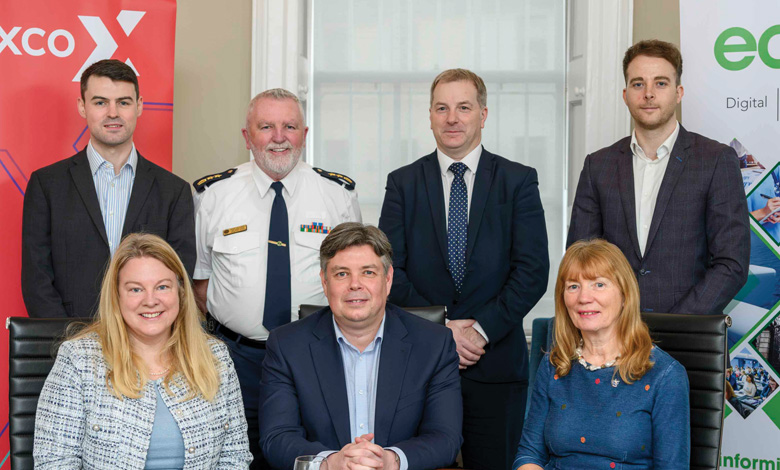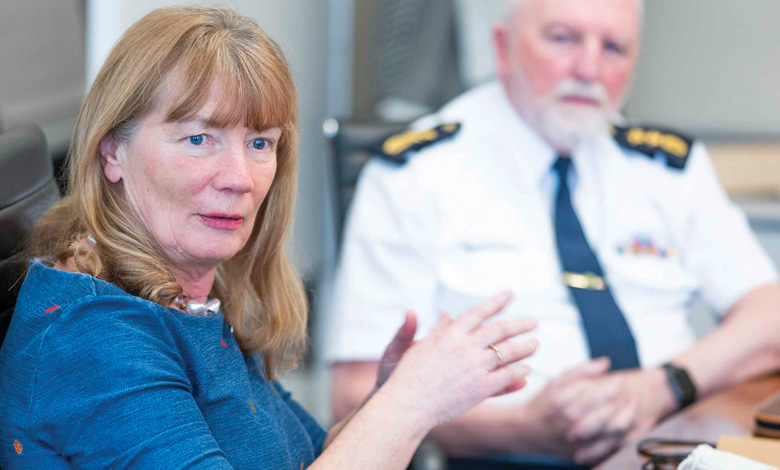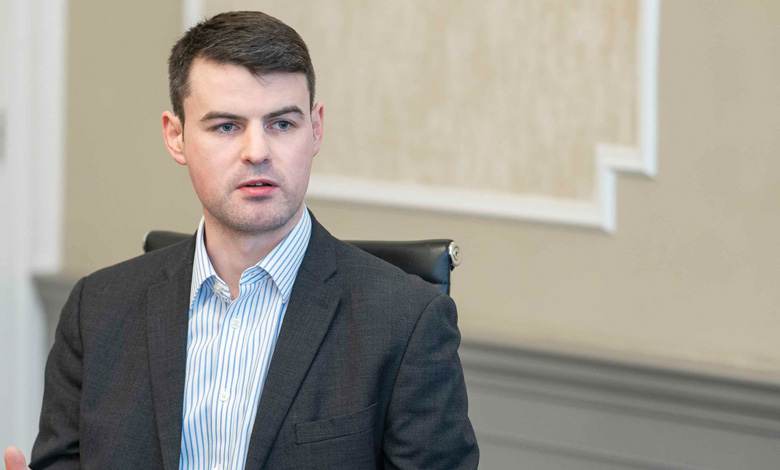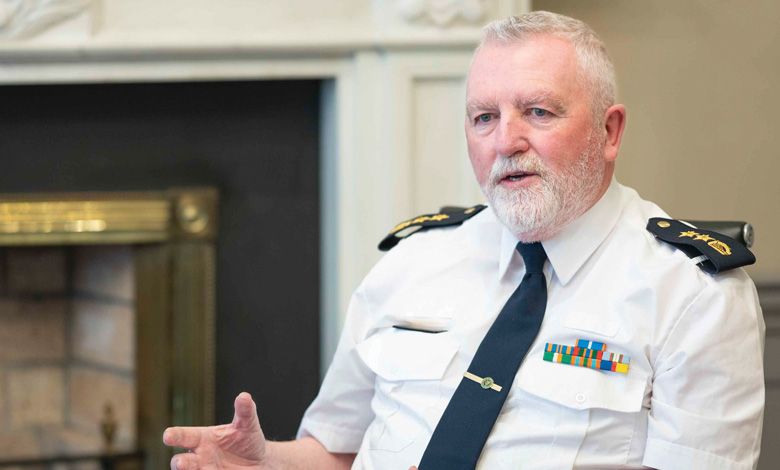Improving societal protection for the Irish public

Fexco hosted a round table discussion, inviting together stakeholders from the across the public sector to explore common challenges in service delivery and efforts to enhance broader societal protection on behalf of the Irish public.
sector to explore common challenges in service delivery and efforts to enhance broader societal protection on behalf of the Irish public.
From your organisation’s perspective, what are the most significant threats to societal protection?
John Swann
Society is faced with a myriad of very serious challenges, including those associated with climate change and the transition to a net zero economy. Interlinked with this is an increasing spread of misinformation and political polarisation, further exacerbated by a distrust of media and politics. Layered on top is the emergence of new technology, including AI. We also have prevailing geopolitical tensions, including war in Europe.

Teresa Leonard
The main challenge from the Department of Social Protection’s perspective is a potential economic downturn or a breakdown in the social contract. These would have a significant impact on our ability to support society’s most vulnerable with welfare payments. Ireland has a social contract which is reliant on a successful economy and in turn ensures that we can provide social protection to those who need it the most. We pay our taxes, including the Universal Social Charge, and the societal consensus is that we must protect those who fall upon hard times at different stages of their lives. There are several factors, as John mentioned, which could also undermine the social contract, including the spread of misinformation and the impact this can have on social cohesion in our country.
James McConnell
Civil Defence supports frontline services to protect society at times of emergency. Given the increased frequency of extreme weather phenomena, a major challenge for us going forward is ensuring the identification of vulnerable persons from state agencies so that they can be protected at times of need. In the context of Storm Éowyn in January 2025, there was a delay in the dissemination of vital information due to GDPR challenges, allied to a shortcoming in our ability to identify those who needed us most. As a result, we had difficulty in locating vulnerable people in order to provide assistance. Ahead of future extreme weather events, we need to ensure that the lessons are learned, and that vulnerable people are given the support and protection that they need at times of emergency.
Tomás Campbell
After several decades of consistent progress, road safety has emerged as a significant challenge in recent years. Research shows that intoxication, speeding, non-use of seatbelts and distraction continue to be the main causes of road deaths. However, following the Covid-19 pandemic, worrying behavioural and attitudinal trends have emerged in relation to these behaviours, which is likely contributing to increases in fatalities on our roads. Increasing numbers of drivers are being caught drug driving and self-reported attitudes towards drink driving have become more permissive. We must ensure that we find the right solutions to challenge these behaviours. The Road Traffic Act 2024 was part of the response, aiming to address the most dangerous behaviours in a systemic way, with an important aspect of that being the speed limit default changes introduced on rural local roads from 7 February 2025.
“There is undoubtedly a need for the private sector to enable implementation of policy.”
John Swann
Derek Tierney
Government’s National Risk Assessment identifies strategic risks to society and sets out mitigations to help protect the wellbeing of our society while reflecting a changing social and economic context. Health threats facing health services include the next pandemic, endemics, microbial resistance, chronic disease prevalence or other health emergencies that can ultimately overwhelm healthcare systems and disrupt societal stability. The challenges facing healthcare, in terms of a growing population and changing demographics, require we do more with existing resources, think about the shifts needed in our healthcare model more towards prevention over care dependence.
Niamh Hodnett
With the emergence of new technology and the increasing digitalisation of our society, we have had to deal with a rise in online harmful and illegal content. In relation to children specifically, one area of strategic focus which is a high priority to us is child sexual abuse material, alongside the ‘rabbit hole’ effect algorithms can have on children. Echo chambers of content can lead to long-term destructive effects such as eating disorders, self-harm, and suicide. We are also focused on the increasing polarisation online and the spread of misinformation and disinformation. We must ensure that we have a digital society which is fit to protect democratic values. As such, we will continue to work with An Coimisiún Toghcháin and An Garda Síochána, as we did throughout the elections in 2024.
How can the private sector best support public service bodies and agencies to improve public service delivery?
Derek Tierney
I believe there is opportunity to partner with the private sector to leverage agility, innovation, share best practice and leverage collective strengths to enhance the capacity of public service bodies to deliver public services. We do not have to begin a project at first principles when we can learn from others’ experiences and transfer a solution which has already been developed, adapting it for public services. The public health sector already benefits from several strategic partnerships and collaborations with the digital and technology sector to introduce digital healthcare solutions for the public.
“The societal consensus is that we must protect those who fall upon hard times at different stages of their lives.”
Teresa Leonard
Teresa Leonard
Unlike other government departments, DSP provides income and other support to its customers on a weekly/monthly basis, placing a very specific set of responsibilities on the Department. We are customer demand-led and will continue to be expected to respond to changing needs on a demand-led basis. DSP has always had strong relationships with the private sector; we use banks and post offices, alongside financial institutions, to support our delivery of payments. All services provided by the Department are highly IT dependent and consequently, it is one of the largest IT organisations in the State. The Department plans, designs, builds, and operates its own IT platforms and services using a mix of inhouse and contracted staff. Currently, we are engaging in discussions on enhancing collaboration to increase resilience, security, and contingencies to be prepared for all threats and eventualities. This involves working with our framework partners as the impact of missing out on making timely Income supports to our customers is such, that we cannot take that risk.
Tomás Campbell
From a road safety perspective, operators must step up and make changes which will enhance the safety of our roads and reduce the number of fatalities. Take the multinational food delivery sector for example. We have observed examples of some food delivery drivers who do not have a high level or regard for the rules of the road, and who often drive vehicles which are not road legal. There is an onus on those MNCs to step up and ensure due consideration to road safety in their operations and that the vehicles used by drivers are all road legal. With hauliers and HGV operators, there are options to put alcohol interlocks on their fleet vehicles – there are companies which already do that – and we would like to see this more widely deployed in the private sector.
Niamh Hodnett
We approach regulation with a supervision-led approach. We want to drive behaviour changes on social media platforms and collaborate with the platforms to implement this. In the event of resistance to this approach, we escalate our actions to investigation and enforcement. Depending on the response, we can move along a framework from regulation and supervision to supervision and enforcement. Our job is also to ensure that broadcast media coverage is fair, accurate and impartial. We use media literacy to address the impact of misinformation and disinformation. Online safety requires a whole-of-society approach, and we need to ensure that we are all on this journey together.
James McConnell
The private sector is in a strong position to assist us with the education and spread of trusted information which can assist us at times of emergency. The private sector has its own role to play here, whether in relation to employees, family members, or the public. The private sector can also help with business continuity. If we look at recent weather events, the number of businesses which were without power demonstrated to us the need for continuity plans in order for people to get their businesses up and running again in the aftermath of a disruptive weather event.
“Ensuring online safety requires a whole-of-society approach.”
Niamh Hodnett
John Swann
The public sector will have to do more with what it has as we go forward. We want to see a broadening of services in range and quality, availability of services, access to timely delivery, and quality of service delivery. When we look at improving services, we must look at it through the lens of what the public needs. The public sector’s strength is setting high-level policy priorities, but there is undoubtedly a need for the private sector to enable implementation of policy, and I think there is an argument for an enhanced role for the private sector in actively feeding into the design of policy so that there is strong understanding at government level of what the challenges to implementation are and navigate the associated challenges.
Amid a prevailing trend towards increasing digitalisation, what role must technology play?
Niamh Hodnett
Organisations are embracing technology, and this has enhanced the delivery of public services. There are also risks from new and emerging technologies which we must be prepared for. For example, AI is an area of huge benefit across the board, especially generative AI which has a huge impact on virtually all aspects of work. However, we must ensure that it is safe to use for society and organisations. AI’s role can be double-edged. For example, while it is highly effective at filtering out harmful and illegal content, there are also instances of AI generating child sex abuse material. We need to ensure that we have a regulatory model which protects individual rights and guards against the commission of crime, while simultaneously unlocking the socioeconomic opportunities associated with digitalisation.
James McConnell
Technology has enhanced the services we can offer to the public. The development of our new voluntary equipment and management system (VEMS) via the Department of Defence Civil Defence Branch has increased our capacity to manage and have real-time information. If we look at drone technology, we can now obtain relatively affordable drones which can enable us to react to crises in real-time by providing aerial imagery to safely evaluate damages caused by natural catastrophes. For instance, following recent storms, Civil Defence collaborated with ESB Networks to determine where exactly the electricity network has been disrupted by storm damage. We must embrace this technology and harness it for enhanced public service delivery.
“We cannot micromanage how a public service body enforces road law, but we can determine what the law is.”
Tomás Campbell
Derek Tierney
Digital for Care 2024-2030 recognises the role that technology plays to enable the delivery of a fiscally sustainable health service in the long-run. As well as using technologies to widen health services, use data analytics, automation & artificial intelligence and digitise health records, we are also using technology to deliver efficiency, boost capacity and productivity. One initiative is the roll out of ‘virtual wards’ where patients at home can be monitored by clinical teams who harness technology. This offers a safe and preferable alternative to in-hospital care, empowers patients and help meet the pressures the healthcare systems face in unscheduled care, boost capacity and widening care for an increasing number of people.
Teresa Leonard
The Department of Social Protection has experienced a high degree of technological advancement. Given the importance of our services and the sensitivity of the data held by the department, cybersecurity is a key challenge, and the security of our systems is an important consideration in undertaking any development. We are satisfied that our services are sufficiently accessible to the people who require them, across a range of channels; including walk-in, online, and phone. For us, the priority is ensuring that there is the sufficient funding to maintain our current systems, ensuring they remain fit for purpose and secure. Of course, to do this we continue to collaborate with partners across government and ensure that best practices are shared.
John Swann
Digitalisation is a key enabler of enhanced efficiencies in the public sector. A key example of this was the development of Eircode, in which technology played a vital role from design to implementation and then rollout. Thus has resulted in increased accuracy of addressing in Ireland, while improving the speed at which an address can be validated, and it was a key enabler of vaccine rollout during the Covid-19 pandemic. From a policy perspective, the EU Open Data Directive is centred in sharing more data online, while the Data Sharing and Governance Act 2019 is designed to ensure that data is shared between departments. However, from working with government departments, there is still a high frequency of siloed data.
“There is opportunity to partner with the private sector to leverage agility, innovation, share best practice and leverage collective strengths.”
Derek Tierney
Tomás Campbell
We have seen a good example in the transport sector in recent years with the introduction of automatic numberplate number recognition technology, which is increasingly available and in use by An Garda Síochána and improving in terms of its capabilities. Using this technology on a Garda mobility device, registration plates can be quickly matched with data held on the Irish Motor Insurance Database, managed by the Motor Insurers’ Bureau of Ireland, and the National Vehicle and Driver Database, which is managed by the Department of Transport. As a result, a Garda member can access real-time information to determine if a vehicle is insured, taxed, or if the driver is disqualified. This is an important example of how we can move existing data outside of siloes and use technology to deploy that data for justified purposes beyond the immediate need of the relevant department or agency in holding that data in the first place.
What single policy initiative would have the greatest impact on Ireland’s societal protection priorities?
James McConnell
In times of national emergency, Ireland is bolstered by its national civil defence service. We must follow the lead of other countries and allow volunteers to be released from their full-time work with no loss of pay when they are required. While this has not traditionally been a challenge within the public service, unfortunately it is more difficult in the private sector.
“Ahead of future extreme weather events, we need to ensure that the lessons are learned.”
James McConnell
Derek Tierney
I do not believe there is one single policy as our challenges are multifaceted, instead an overarching ambition or goal to align several initiatives. To deliver the best health outcomes we need to continue to invest in a ‘healthier Ireland’ requiring a holistic approach directly and in wider determinants of health. This includes shifting from care dependence to prevention, empowering our workforce, non-communicable disease prevention, healthy ageing, mental health, early tears, physical activity, and continuing to raise awareness of the harms posed by poor lifestyle choices.
Tomás Campbell
We, as government departments at the direction of ministers, set the legislative frameworks for policies. We cannot micromanage how a public service body enforces road law, but we can determine what the law is. It is not about just one initiative, but I think the new Programme of Government gives us a clear direction in terms of new judicial sanctions for violations of road traffic law in the form of graduated penalties and re-education courses.
Teresa Leonard
From a DSP perspective, the area which can have the greatest impact is addressing the current housing situation. If the societal risk associated with access to housing was addressed, many associated challenges facing the Department and society become much less of a challenge. For example, the Department is heavily involved in paying rent allowance, locating emergency accommodation, and providing income support payments; all of which would be resolved.
Niamh Hodnett
Ensuring online safety requires a whole-of-society approach, and Coimisiún na Meán is one part of this as a regulator. There is also a role for legislators, government departments, educators, parents, academics, NGOs, and collaboration at a European and global level. It is important to be able to communicate quickly across channels. We are continually making progress and breaking out of our silos to meet these challenges.
John Swann
In the context of data and digitalisation, the Public Service Data Strategy and Connecting Government 2030 have set out a clear roadmap. What has let us down at times has been implementation and roll it has been slow; though I acknowledge that some areas have performed better than others. Instead of any new policy, I would propose that these existing policies are implemented more comprehensively and at pace.







